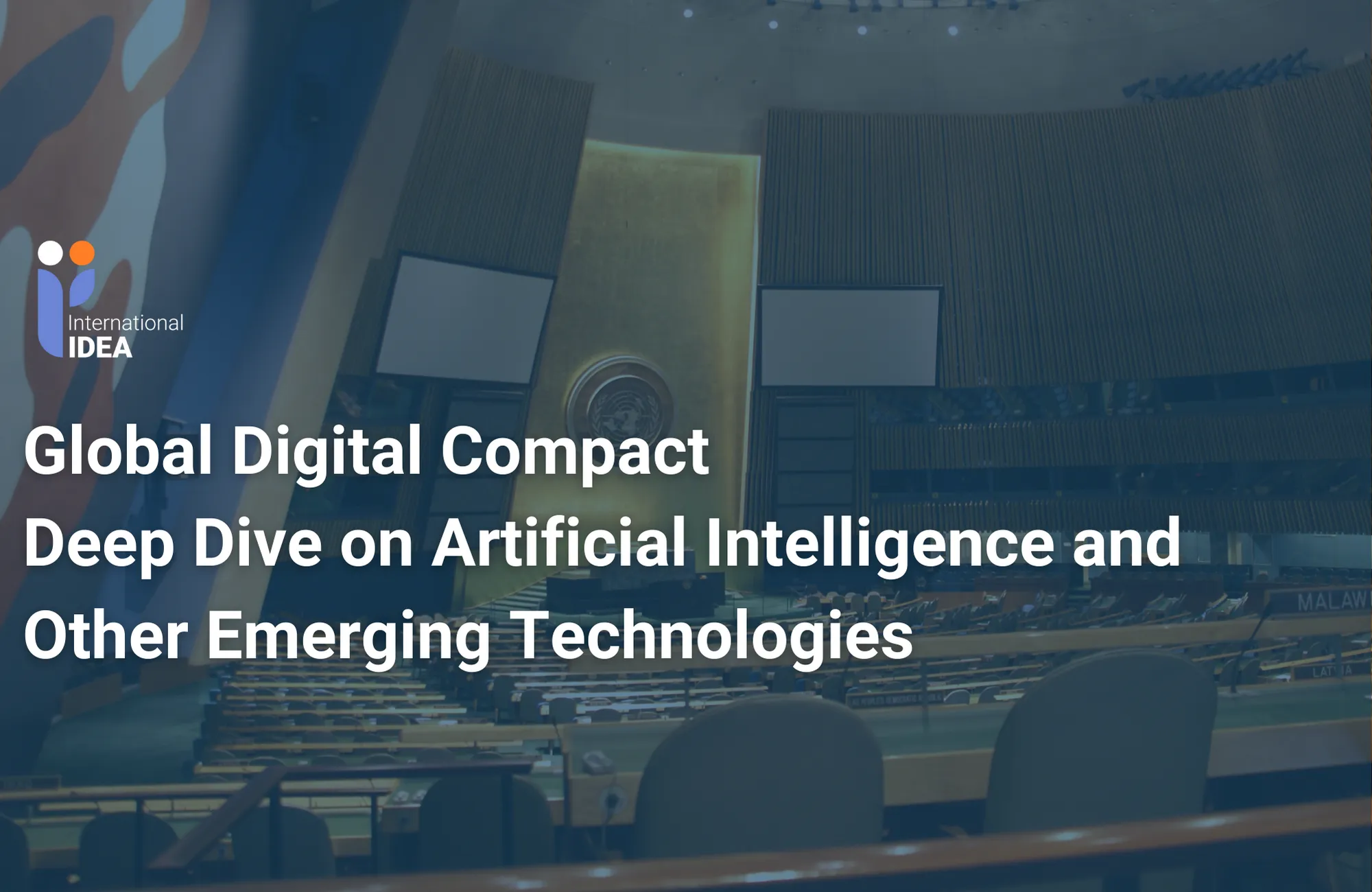Statement at the Global Digital Compact informal consultation: Deep Dive on Artificial Intelligence and Other Emerging Technologies

“Global Digital Compact – Deep Dive on Artificial Intelligence and Other Emerging Technologies”
25 May 2023
UN Headquarters, New York
Statement by, Kevin Casas-Zamora, Secretary-General
International Institute for Democracy and Electoral Assistance (IDEA)
Excellencies,
We would like to thank the co-facilitators of Sweden and Rwanda for the opportunity to provide inputs to this deep dive on artificial Intelligence and other emerging technologies for the Global Digital Compact.
Artificial intelligence (AI) and other emerging technologies are transforming the world at breakneck speed. International IDEA is an intergovernmental organization mandated to strengthen democracy worldwide. We therefore focus on the impact on AI on democracy and the importance of developing a democratic governance structure for AI that helps maximize its potential and minimize its most harmful effects.
AI and emerging technologies can be key to revitalizing democracy. They enhance access to information that can be used by people to hold governments to account. Online platforms powered by AI can enable greater inclusion, by allowing marginalized groups to make their voices heard, engage in policymaking and exercise their democratic rights. AI can enhance the data analysis in participation and deliberation tools and help improve policy making and service delivery by making them more attuned to citizen needs. Equitable and accountable policies and services in turn increase citizen trust, a key ingredient for enabling sustainable development.
But the risks these technologies present for democracy are real. We have already seen the spread of disinformation and hate speech enabled by existing social media platforms and how this fuels toxic polarization, eroding the democratic fabric in both older and newer democracies. The expansion of AI risks exacerbating these harms by expanding the scale, reach and sophistication of the disinformation spread. This can be particularly damaging in contexts of elections, potentially eroding trust in the core pillar on which democracies rests. We also know that AI systems and their often-opaque algorithms can amplify existing biases and reinforce inequalities. Their ability to analyze massive amounts of data can also harm privacy and in the worst cases, be used by malign actors to control their citizens, undermining their rights. The unleashing of AI without a full understanding of its impact is outright dangerous. And the ownership and control of AI systems by a few private actors places this critical democratic infrastructure in the hands of non-democratically elected actors, usually from a few geographically concentrated and often insufficiently diverse companies for whom private interests most often trump the public good. Unrestrained competition to develop AI, harbors risk not simply for democracy, human rights, and human development, but for the future of our species. Artificial Intelligence should therefore be regulated in ways that preserve the self-determination and moral agency of human beings, which is what democracy and human rights intend to protect.
We, therefore, urge this assembly and the Global Digital Compact to adequately address the risks that AI poses for democracy and to stipulate that AI data, systems, and business models be based on the democratic principles of transparency, accountability, inclusion, equity, protection of human rights and rule of law online. Transparency of data sources and uses, as well as of algorithms, must be mandated to the greatest extent possible. Ultimate human control over and accountability for fundamental collective decisions –particularly in the political and military realms—should the preserved at all costs. We count on the Global Digital Compact to build on evolving global, regional, and national good practice guidelines in this field, harmonize them, and fill existing gaps, through multi-stakeholder dialogue, to ensure that AI technologies strengthen rather than undermine democracy. Echoing the recommendations of the Center for AI and Digital Policy, we also ask the GDC to consider a comprehensive legally binding convention for AI that goes beyond voluntary principles. We urge the Global Digital Compact to encourage countries to enable genuine multi-stakeholder conversations to develop jointly agreed standards, policies, regulations, and technological solutions that ensure democratic principles in all phases of the development of AI systems and to create robust mechanisms for their independent oversight. While these frameworks need to be developed and adapted to each national context, their transnational nature requires more than ever multilateral approaches, that this body is uniquely positioned to foster. Mitigating the risks of runaway AI, while leveraging its exceptional opportunities for well-being, offers the most promising arena for international cooperation. International IDEA hence urges all countries to engage in meaningful collaboration around the regulation of Artificial Intelligence.
Thank you.
